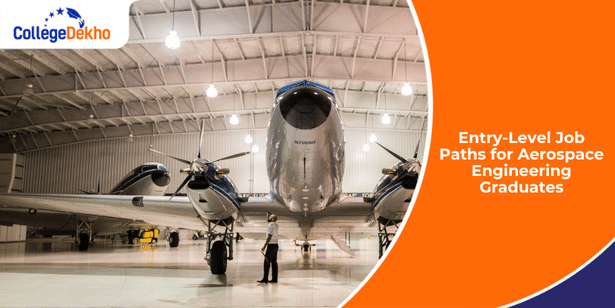
If you are dreaming of building aircraft or launching satellites or designing rockets, look no further; an aerospace engineering degree can make it all happen. The aerospace industry in India is expanding; there are bright opportunities in organizations like ISRO and HAL, and global bigwigs like Boeing and Airbus. You might also be wondering which role would suit you best and how much you would earn as a fresher. The cool thing is that aerospace engineers end up working on some of the coolest technology on and off the planet.
Entry-Level Job Paths for Aerospace Engineering Graduates
Check here the best entry-level jobs that are offered to aerospace engineers with their average annual salary and company names that are typically hiring for these roles:
Job Role | Average Salary (INR) | Typical Hiring Companies |
|---|---|---|
Aerospace Design Engineer | ₹6 - 10 LPA | Airbus, Boeing, HAL, Mahindra Aerospace, TATA Advanced Systems |
Avionics Engineer | ₹8 - 12 LPA | Honeywell, Thales, Collins Aerospace, Lockheed Martin |
Propulsion Engineer | ₹10 - 14 LPA | Rolls-Royce, GE Aviation, Safran, Pratt & Whitney |
Flight Test Engineer | ₹12 - 16 LPA | Boeing, Airbus, HAL, DRDO, NAL |
Satellite Engineer | ₹10 - 15 LPA | ISRO, Antrix Corporation, TATA Advanced Systems, L&T Aerospace |
Systems Engineer | ₹8 - 12 LPA | Boeing, Airbus, Collins Aerospace, Lockheed Martin |
Manufacturing Engineer | ₹6 - 9 LPA | Max Aerospace, HAL, Boeing, Airbus, L&T Aerospace |
Structural Engineer | ₹7 - 11 LPA | Boeing, Airbus, HAL, DRDO, L&T Aerospace |
Materials Engineer | ₹6 - 10 LPA | ISRO, DRDO, HAL, TATA Advanced Systems, L&T Aerospace |
Quality Assurance Engineer | ₹5 - 8 LPA | Honeywell, GE Aviation, Boeing, Airbus, HAL |
Simulation & Modeling Engineer | ₹7–10 LPA | Airbus, Boeing, GE Aviation, Collins Aerospace |
Flight Controls Engineer | ₹8 - 11 LPA | Airbus, Boeing, HAL, DRDO |
Electrical Systems Engineer | ₹7 - 10 LPA | Collins Aerospace, Honeywell, Thales, Lockheed Martin |
Software Engineer (Aerospace) | ₹6 - 9 LPA | GE Aerospace, Honeywell, Collins Aerospace, L&T Aerospace |
Maintenance Engineer | ₹5 - 7 LPA | HAL, Air India Engineering Services, SpiceJet Engineering, GoAir Engineering |
Aerospace Engineering Job Roles with Descriptions
Now that you have an idea of what these roles are that you get after completing aerospace engineering, let's understand what you actually need to do in these jobs.
Job Role | Job Description |
|---|---|
Aerospace Design Engineer | As an aerospace design engineer, you’ll be creating aircraft or spacecraft parts that are strong, light, and efficient. You’ll use CAD software and design principles to bring ideas to life, making sure every part fits perfectly. |
Avionics Engineer | Avionics engineers handle the electronic systems that control aircraft, like navigation, communication, and radar. You’ll work on circuits and software to make flights safer and smarter. |
Propulsion Engineer | Propulsion engineers focus on engines, turbines, and rockets. You’ll be involved in designing, testing, and improving systems that push aircraft and spacecraft through the air or space. |
Flight Test Engineer | Flight test engineers get hands-on with aircraft testing. You’ll check performance, safety, and stability during actual flights, analyzing data to make improvements. |
Satellite Engineer | As a satellite engineer, you’ll design, build, and monitor satellites. From communication satellites to earth observation systems, you’ll make sure they function properly in space. |
Systems Engineer | Systems engineers connect all parts of an aircraft or spacecraft. You’ll ensure that engines, avionics, and controls work together smoothly for safe and efficient operation. |
Manufacturing Engineer | Manufacturing engineers bring designs to life. You’ll plan how aircraft parts are made, check quality during production, and make sure everything is efficient and cost-effective. |
Structural Engineer | Structural engineers make sure aircraft and spacecraft are strong and safe. You’ll analyze loads, stresses, and materials to ensure wings, fuselage, and other parts can handle flight conditions. |
Materials Engineer | Materials engineers select and test materials for aircraft and spacecraft. You’ll work on metals, composites, and alloys to ensure parts are light, strong, and heat-resistant. |
Quality Assurance Engineer | Quality assurance engineers make sure everything is built correctly and safely. You’ll inspect components, run tests, and ensure that industry standards are met before the product takes off. |
Simulation & Modeling Engineer | You’ll use computer models and simulations to predict how aircraft and spacecraft behave. This helps teams test designs safely and efficiently without building everything physically. |
Flight Controls Engineer | Flight controls engineers focus on the systems that help pilots steer planes. You’ll work on software and mechanical systems to make flying stable, responsive, and safe. |
Electrical Systems Engineer | Electrical systems engineers handle all onboard electrical systems, from power distribution to avionics. You’ll ensure everything runs reliably during flights. |
Software Engineer (Aerospace) | Aerospace software engineers develop programs for simulations, control systems, and avionics. Your work helps aircraft operate efficiently and safely. |
Maintenance Engineer | Maintenance engineers ensure aircraft and spacecraft stay in top shape. You’ll inspect, troubleshoot, and repair systems to keep everything airworthy and safe for operations. |
Skills Required for Aerospace Engineers in India
There are some very important skills required to get a job after completing aerospace engineering, and some of those skills include:
Skill | Why It Matters |
|---|---|
Strong Understanding of Aerodynamics | You need to know how air flows around wings, rockets, or spacecraft. It’s the foundation of everything you design or test. |
Hands-On Technical Skills | Being comfortable with tools, machinery, or lab equipment helps you bring designs to life and troubleshoot problems on the spot. |
CAD and Simulation Software | Programs like CATIA, SolidWorks, or MATLAB let you model aircraft, simulate behavior, and check your designs without building them first. |
Problem-Solving & Critical Thinking | Aerospace is full of challenges. You’ll need to think quickly and find solutions when things don’t go as planned. |
Attention to Detail | A small error in design or testing can have big consequences. Precision is key in everything from material selection to assembly. |
Communication Skills | You’ll be working with engineers from different fields, so explaining your ideas clearly and reading reports is super important. |
Teamwork & Collaboration | Most projects are done in teams, so being able to work with others, share ideas, and coordinate is essential. |
Programming & Software Knowledge | Knowing basic programming (Python, MATLAB, or embedded systems code) helps when working with simulations, controls, or avionics. |
Curiosity & Willingness to Learn | Aerospace is always evolving. Staying updated with new technologies or techniques is a must to stay ahead. |
Project Management Skills | Even as a fresher, managing small tasks, timelines, and resources efficiently will make your work smooth and respected. |
Aerospace engineering offers some of the most exciting and rewarding careers you can imagine. Choose the type of work that fires your heart-whether designing an aircraft, testing engines, or launching satellites into outer space. Keep innovating, keep being curious about new technologies, and remember-you're building the future of flight and space exploration.

















Similar Articles
B.Tech Lateral Entry Admissions 2026: Entrance Exams, Eligibility Criteria, Admission Process
65+ Percentile in JEE Main 2026 Predictions and Expectations
99.92+ Percentile in JEE Main 2026 Predictions and Expectations
180 Marks in JEE Main 2026 Predicted Percentile Score and Rank
IIT Hyderabad Summer Internship 2026: How to Apply
99.93+ Percentile in JEE Main 2026 Predictions and Expectations